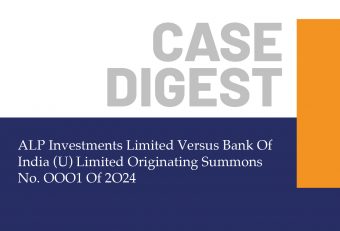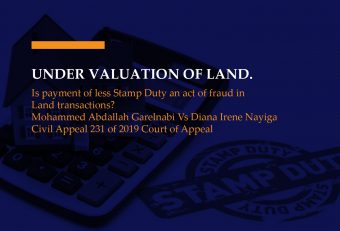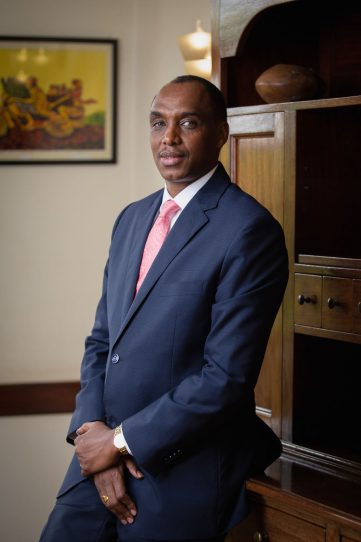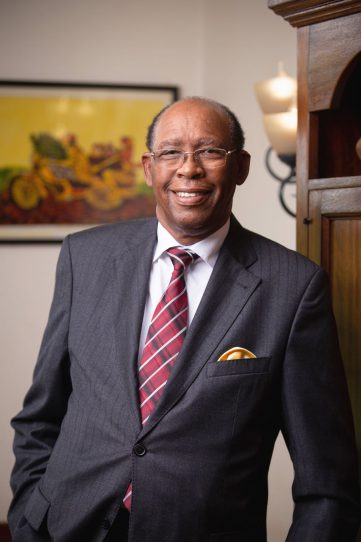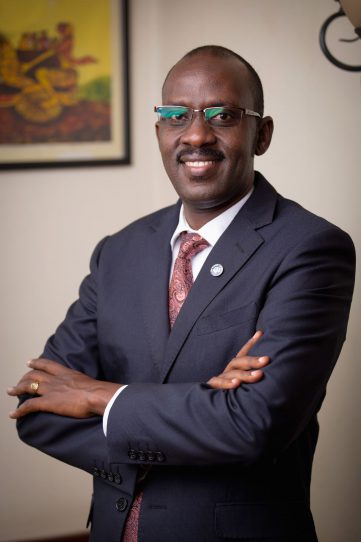Banking, Finance and Agriculture
Milestones
Debt collections and recoveries
• Recovered and collected over UGX 50 billion from multiple local and foreign debtors on behalf of the Uganda Civil Aviation Authority (“CAA”).
• Recovered and collected over UGX.15,000,000,000 (Fifteen billion shillings) of agricultural loans extended to cotton ginneries in Uganda under General Conditions applicable to Loan, Guarantee and Grant Agreements of the African Development Bank and disbursed through the Agricultural department of Bank of Uganda.
• Recovered and collected over UGX.7,000,000,000 (Seven billion shillings) for Non-Performing Assets Recovery Trust (“NPART”), a statutory entity established by law in Uganda as an expeditious machinery for the recovery of certain loans and investments made by the defunct Uganda Commercial Bank.
• Recovered approximately 300,000 pound sterling from Faisal Islamic Bank in respect of a Bank Guarantee issued in favour of Uganda Communications Commission through a foreign attachment of assets in a United Kingdom Bank.
• Successfully represented the Government of Uganda and the President of the Republic of Uganda in a debt claim worth over UGX.50,000,000,000 (Fifty billion shillings only) and managed to lift the attachment over Government assets in the United Kingdom.
• Successfully represented the Uganda National Roads Authority (“UNRA”) in numerous claims for contractual compensation worth over Pound Sterling 57,000,000.
• Managed a multi-billion shilling receivables portfolio for Barclays Bank Uganda Limited (Now “Absa Bank Uganda Limited”)
• Collected over UGX. 1,500,000,000 (Uganda Shillings One Billion Five Hundred Million) arising of an assigned portfolio of UGX. 3,000,000,000 (Uganda Shillings Three Billion) from various unsecured loan defaulters of Absa Bank Uganda Limited.
• Assisted Nile Breweries Limited in bringing down their debt portfolios from their country wide network of distributors, agents and debtors.
• Handling the debt collection for UMEME, which has so far amounted upwards of UGX? 80,000,000,000 (Uganda Shillings Eighty Billion).
•Managed multi-billion shilling receivables portfolios for Stanbic Bank Uganda Limited.
• Engaged in the recovery of debts on behalf of Standard Chartered Bank Uganda Limited worth over USD 30,000,000 (United States Dollars Thirty Million) and UGX 20,000,000,000 (Uganda Shillings Twenty Billion).
Finance structuring and advisory
• Advising a group of financial institutions on the structuring and negotiation of a syndicated loan facility worth over Euro 219 million for the construction of vital infrastructure to a sovereign state. The firm conducted the requisite due diligence and advised on the compliance requirements needed to give
the transaction legal effect.
• Advised an international financial institution on a loan worth over USD 100 million to a sovereign nation for the purchase of security infrastructure.
• Advised an international financial institution on a project finance facility worth over USD 200 million for the construction of an airport. The firm conducted a due diligence, advised on requisite corporate and regulatory authorisations, reviewed the financial documents and provided advice on the land acquisition requirements.
• Represented one of the leading financial institutions in the restructuring of a complex loan facility worth over USD 100 million. The transaction involved 5 financial institutions and 7 corporate borrowers and transcended numerous jurisdictions including Uganda, Kenya, Tanzania, Nigeria, United Kingdom,
United Arab Emirates and Mauritius.
• Representing a client in Uganda’s largest banking and finance matter to ever be litigated under the Financial Institutions Act. The case pertains to among others a cross section of banking laws and regulations, insolvency of financial institutions, credit and loan agreements and is worth over USD.120 million dollars.
• Represented one of the largest money transfer remittance companies in East Africa in analleged money laundering scheme worth over USD.14 million dollars.
• Represented a bank in a transaction relating to Revolving Trade Finance Line of Credit facilities worth USD 10 million to Uganda Development Bank.
• Advised on a USD 150 million facility to an international telecommunication company from a number of financial institutions with Deutsche Bank as agent.
Articles on Banking, Finance and Agriculture
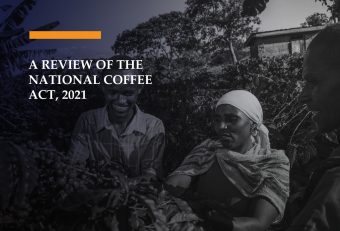
A Review Of The National Coffee Act, 2021.
Fri Jan 28, 2022
Banking, Finance and Agriculture Experts
Banking, Finance and Agriculture related FAQs
Land in Uganda belongs to the citizens of Uganda and is owned in accordance with the land tenure systems. These are freehold, Mailo, Leasehold and customary.
a. Freehold Tenure refers to land held/owned by an individual registered on the certificate of title as the land owner for life. There are no tenants by occupancy and Kibanja holders on this land.
b. Mailo Tenure is land held by a land owner rooting from the 1900 Uganda Agreement and 1928 Busullu Envujjo Law. It is mainly in the Buganda region, currently central Uganda. Both the land owner registered on the certificate of tittle and tenants by occupancy and Kibanja holders have interests on this land.
Mailo land owners have the same rights as freehold land owners, but they must respect the rights of lawful and bona fide occupants and Kibanja holders to occupy and live on the land.
c. Leasehold Tenure is land which a land owner allows another person to take exclusive possession for a specific period of three years or more in exchange for rent. A lease may be created either under a contract between the parties or by law. The person granted a lease must use the land for the specific purpose as agreed with the land owner.
d. Customary Tenure is where the land is owned based on the norms and traditions of a given society or community. One can even own land individually under customary tenure as long as it has been handed down from generation to generation using that society’s customs.
In 2015, the government of Uganda introduced Certificates of Customary Ownership (CCOs) for owners of customary land. A customary land owner can apply for a CCO as proof of ownership of the land. This tenure is the most common form of land holding in Uganda.
There are a number of laws which have an impact on land ownership rights and interests in Uganda. These include;
a. The Constitution of Uganda, 1995
b. The Land Act, Cap 227 as amended
c. The Land Acquisition Act, Cap 226
d. The Land Policy, 2013
e. The Registration of Titles Act, Cap 230
f. The National Environment Act, 2019
g. The Water Act, Cap 152
h. The Mining Act, 2003
i. The Petroleum (Exploration, Development and Production) Act, 2013
j. The Electricity Act, 1999
k. The Investment Code Act, Cap 92
l. The Road Act, 1964
m. The Access to Roads Act, Cap 350
n. The Traditional Rulers (Restitution of Assets and Properties) Act, Cap 247
o. The Succession Act, Cap 162
p. The Illiterates Protection Act, Cap 78
q. The Survey Act, Cap 232
r. The National Forestry and Tree Planting Act, No. 8 of 2003
s. The Physical Planning Act, No. 8 of 2010
Any person who before the coming into force of the 1995 Constitution of Uganda, had either occupied and utilized or developed any land unchallenged by the registered owner or agent of the registered owner for twelve years or more; or had been settled on land by the Government or an agent of the Government, which may include a local authority for instance local council chairpersons.
- Tenants by occupancy have a right to occupy land under the laws of Uganda.
- They have the right to enter transactions with respect to the land they occupy with the consent of the registered land owner, which should not be denied on unreason able grounds.
- The law strictly requires tenants by occupancy to give the land owner first option where they wish to sell their interest and vice versa where a land owner wants to sell the land. This must be on a willing buyer willing seller basis.
- These rights and duties extend to Kibanja holders who must also obtain the consent of the registered owner before selling of their Kibanja.
- They must also be given the right of first option to buy the land if the land owner wants to sell the land.
- Where a tenant by occupancy or Kibanja holder sells their interest without giving the land owner first option, he or she commits an offence and loses the right to occupy the land.
- A person who buys registered land which has tenants by occupancy must respect and observe their rights.
- He or she must not evict them except if he or she obtains a court order of eviction for non-payment of the annual nominal ground rent.
- Similarly, any person who buys registered land in Buganda must observe the rights of Kibanja holders on the land.
- Tenants by occupancy and Kibanja holders can also register a caveat at the Registry of Lands where they have reason to suspect that the registered land owner intends to enter a land transaction which will affect their rights and interests.
Family Land is defined as;—
i. Where the ordinary residence of a family is situated;
ii. Where the ordinary residence of the family is situated and from which the family derives sustenance;
iii. Land which is treated as family land according to the norms, culture, customs, traditions or religion of the family
Ordinary Residence refers to the place where a person continuously resides and a place which such person intends to make his or her home for an indefinite period.
Land from which a family derives sustenance Means—
- land which the family farms; or
- land which the family treats as the principal place which provides the livelihood of the family; or
- land which the family freely and voluntarily agrees, shall be treated as the family’s principal place or source of income for food.
